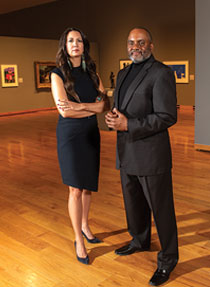
Contact Us
Institutional Communications
Bureau of Mines Building, Room 137
Laramie, WY 82071
Phone: (307) 766-2929
Email: cbaldwin@uwyo.edu
Stealing Culture
September 10, 2021

Art Museum Director and Chief Curator Nicole Crawford and College of Law Professor
Darrell Jackson at the UW Art Museum.
The UW College of Law and Art Museum team up for an international look at how art and artifacts are collected and repatriated.
By Micaela Myers
In the 2018 blockbuster Marvel movie Black Panther, Erik Stevens, played by Michael B. Jordan, examines artifacts in a museum’s African display. He explains to the museum curator that an artifact is from his country and asks if her ancestors paid a fair price for it or stole it. This scene, though fictional, is at the heart of the questions University of Wyoming Professor of Law Darrell Jackson and Art Museum Director and Chief Curator Nicole Crawford examine as part of their partnership on the subject of stealing cultural artifacts.
It all started a few years back when Jackson and Crawford took part in UW’s interdisciplinary UW in Scotland program for faculty and students. From there, the two delved into the project, wrestling with questions of law, ethics and culture relevant to museum collections. Since then, they’ve developed interdisciplinary classes, published a book chapter and two peer-reviewed journal articles, spoken on the topic internationally and begun working with other museums and universities, including the University of Lisbon with its colonial collections.
Unlike a car title or Carfax history, museums traditionally do not require legal proof of where and how a piece originated and its historical journey to the present-day institution. When museums examine an item’s provenance, there are often gaps. Many countries’ history of colonialism leaves them with artifacts that should likely be repatriated, but doing so is largely uncharted territory.
The United States has the Native American Graves Protection and Repatriation Act, which, though imperfect, provides a process for museums that receive federal funds to repatriate Native American remains and certain cultural items. Thus, other countries are looking to the U.S. for direction.
“We’re starting to work with University of Lisbon to help them set some guidelines for their colonial collections, especially Angola,” Crawford says. The director there wants to return the items but needs a process.
Jackson and Crawford are also speaking with folks in Australia, Japan and the United Kingdom.
“We’re looking at it academically and practically,” Crawford says. “The work we’re doing in Lisbon is getting into the collections and figuring out how they were collected, where they came from, should they be returned and how to return them.”
Trust and connections must be built between the possessing country and the originating country.
“The Benin Bronzes provide a great example,” Jackson says. In that case, Germany recently agreed to return to Nigeria priceless artifacts that were stolen during the colonization of Africa.
“We’re seeing a social response,” he says. “That dialogue is going on across the world and starts people thinking about what kind of regulations could exist both domestically and internationally.”
Back at home, the two main obstacles are funding and coordinating time between the two UW departments to allow Crawford and Jackson to continue this important work, a pioneering effort in this emerging field.
“Interdisciplinary is an act,” Jackson says. “It’s a verb, not a noun.”
Already, the next generation is excited about these efforts. Crawford and Jackson taught a class at UW with honors and law students and plan to offer a similar study-abroad experience to Europe next summer. They also taught a virtual summer class to Shanghai University.
“It was so cool to be able to watch the interaction and discussion,” Jackson says of the UW class. “They did presentations and role playing. It was awesome to see the dynamics of things they hadn’t thought of before and even things we hadn’t thought of before.”
Contact Us
Institutional Communications
Bureau of Mines Building, Room 137
Laramie, WY 82071
Phone: (307) 766-2929
Email: cbaldwin@uwyo.edu


